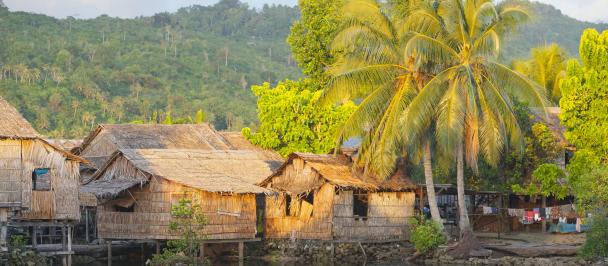Author: Rustam Pulatov, Effective Governance Team Officer-in-Charge
Fiji fosters a culture of preparedness
May 30, 2023

Minister for Home Affairs and Immigration, Hon. Pio Tikoduadua (left), with UNDP Pacific Office in Fiji’s Rustam Pulatov.
In the wake of the devastating COVID-19 pandemic, nations across the globe have come to realise the critical importance of preparedness for future emergencies.
As a Pacific Island nation, Fiji treads the delicate balance between relative safety from public health emergencies – thanks to its geographical remoteness – alongside the inherent complexities and vulnerabilities that accompany its status as a developing Pacific Island nation. the fourth largest economy in the Pacific1 (that ranking including the two regional superpowers of Australia and New Zealand) is no exception to this rule, with the country now assessing its state of readiness in a post-pandemic world.
Lessons Learned
The COVID-19 pandemic has demonstrated to all corners of the globe the dire consequences of unpreparedness. Fiji, as a developing country, understands the complexities and vulnerabilities it faces. By actively investing in preparedness initiatives, Fiji shows a commitment to safeguarding its population and ensuring a swift response to any future threats.
Collaborative Training
A series of training sessions conducted by the Australasia Major Incident Medical Management and Support (MIMMS) Organization have taken place at the Blackrock Camp in Nadi, with frontline staff, first responders and clinicians at the country’s points of entry participating gathering the tools needed to swiftly respond to any emergency threat.
These sessions serve multiple purposes. Firstly, they equip participants with vital skills and foster a sense of inter-agency collaboration. And secondly, MIMMS (who are supported by Australia's Department of Foreign Affairs and Trade) adopts a train-the-trainers model. This approach involves inviting back many of the individuals who have successfully completed the course to train future intakes, ensuring the sustainability and expansion of the program.
In addition, by engaging professionals from various sectors such as Customs, Immigration, and the Fire Service, Fiji establishes robust relationships that will prove invaluable in times of crisis.

Participants from across a range of key agencies have been taking part in state of readiness training at the Blackrock Camp in Nadi.
International Support
Fiji's preparedness efforts are not undertaken in isolation. The Government of Japan, through the United Nations Development Programme (UNDP), is providing support for Fiji's border management activities. This collaboration with UNDP – with additional technical support from the International Organization for Migration and the United Nations Conference on Trade and Development – ensures that Fiji's border management capacities, capabilities, and systems are reinforced, creating a stronger preparedness against traditional and non-traditional threats.
The Culture of Preparedness
Minister of Home Affairs and Immigration, Pio Tikoduadua, emphasizes the need to instil a culture of preparedness in this post-pandemic world. By educating and empowering individuals and service providers, Fiji aims to normalise preparedness as a priority. This proactive approach will enable Fiji to respond effectively and mitigate the impacts of future emergencies.
Global Significance
Fiji's commitment to preparedness goes beyond its own borders. As a nation prone to disasters, Fiji serves as a crucial example for other countries grappling with similar challenges. By staying ahead of the game, Fiji sets a precedent for the world, encouraging other nations to prioritize emergency preparedness and collaborate on a global scale.
Fiji's proactive stance on emergency preparedness and border management showcases its determination to protect its citizens and respond swiftly to future threats. Through collaborative training, international support, and a culture of preparedness, Fiji has emerged as a model for global resilience. As we navigate the uncertain terrain of a post-pandemic world, let Fiji's efforts serve as a reminder that preparedness is not a luxury, but a necessity.
By prioritizing resilience, we can build a safer and more secure future for all.

 Locations
Locations


